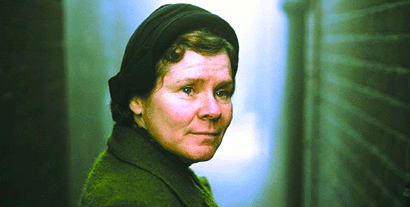Mike Leigh’s ‘Vera Drake,’ finely observed, may be the year’s best film
Mike Leigh comes up with his finest film yet in this story set in post-Word War II London. Vera (Imelda Staunton) is a housemaid with a loving blue-collar husband (Philip Davis), and two grown children, mousily shy Ethel (Alex Kelly) and breezily confident Sid (Daniel Mays), a tailor.
She seems a pretty normal woman, if inordinately goodhearted and generous, except for one thing. She performs illegal abortions, gratis, for various women who find themselves “in trouble.” This action is motivated by nothing more than Vera’s deep empathy for, and desire to help, those in need, but when one of her abortions goes amiss and nearly kills a girl, she is arrested and sent to trial.
With a simplicity rare for him––or, indeed, any other filmmaker––Leigh draws a full, behaviorally rich picture of these workaday lives, marked by a sensitivity to detail which practically pulls you under his characters’ skins. It’s certainly his best work since “Secrets and Lies,” marked by a kind of unvarnished truth which that earlier absorbing, at times hysterical, film lacked.
I was not as much of a fan of his Gilbert & Sullivan film, “Topsy-Turvy,” as many were. Despite its painstaking period recreation and research, there was a slightly fusty museum quality to it, and the dialogue was irritating, far too pretentiously “literary,” straining for a bon mot-filled Victorian élan which rang false to me. In “Vera Drake,” what comes out of the characters’ mouths always has a vivid authenticity, with the spontaneity of real life, in a wondrously intriguing variety of accents, ranging from pure East End to poshest Mayfair. Leigh, born in 1943, was obviously a keenly observant child during the 1950s in which this film is set. Leigh achieves a masterly nostalgia worthy of Proust. If the film has any flaw, it’s only in the too-obvious, ominous music underlining Vera’s abortion activities and their dire outcome.
Vera is the sort of character who could easily be tiresome, with her seemingly one-note do-good-ism and eternally cheery optimism, even given her laborious lot in life. But Staunton invests the character with such recondite humanity that you completely succumb to the modest charm of this bustling little sparrow of a woman. She’s an unstoppable life force, a bringer of cheer and comfort to all she encounters, which makes her ultimate destruction all the more searing. Her performance will be the benchmark against which all other female performances this year will be rated, and it’s particularly gratifying to see Staunton, a real character actress along the lines of the late Shirley Booth, who has done so much fine work on stage and screen, get such a full-bodied opportunity to shine.
Staunton is terrific, but she is far from the whole show. Leigh has directed a dazzling ensemble of actors with nary a false note among them. Davis attains a lovely chemistry with Staunton; their tender scenes, chatting in bed, constitute one of the truly rare, most convincingly contented marriages ever filmed. Mays gives a star-making performance as the irresistibly charming, cherubic Sid, whose bonhomie masks a rather terrifying conformity when the family chips are down. Kelly evokes Tracey Ullman doing Kay, her mousy Brit secretary routine, but Eddie Marsan as her nerdy, all-too-likely suitor is very touching.
Memorable bitches have always figured strongly in Leigh’s oeuvre and there are three absolute ripsnorters here. A wonderfully strong and toxic Ruth Sheen recalls the great Kay Walsh as Lily, Vera’s black marketeering “friend,” who secretly exacts graft from the patients. Lesley Sharp lives up to her surname as the mother of the girl who nearly dies, viciously biting off her syllables as she reports Vera to the police. In just a few scenes, Heather Craney creates a full portrait of Vera’s vain, venally bourgeois sister-in-law, forever peering down her nose at her supposed inferiors.


































